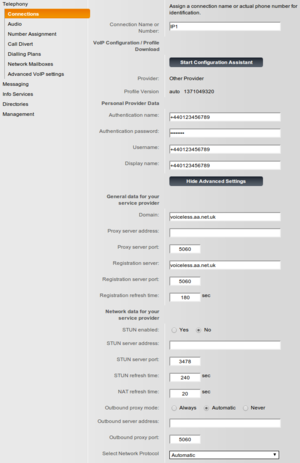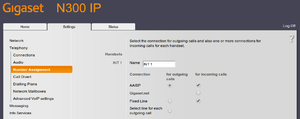VoIP Phones - Gigaset N300: Difference between revisions
(clean up) |
m (→IP address) |
||
| Line 25: | Line 25: | ||
= IP address = |
= IP address = |
||
By default the base unit picks up an IP address using DHCP. This can be over-ridden by connecting to "Settings -> IP Configuration", selecting "Static" and filling in the address details as required. Then click on the "Set" button. |
By default the base unit picks up an IP address using DHCP. This can be over-ridden by connecting to "Settings -> IP Configuration", selecting "Static" and filling in the address details as required. Then click on the "Set" button. By default, the device only allows access to it's web interface from the local subnet. |
||
=N300 and Voiceless= |
=N300 and Voiceless= |
||
Revision as of 10:37, 24 September 2021
Configuring a Siemens Gigaset phone for AAISP
| Feature Notes | |
|---|---|
| Supports 302 Redirect | No |
| Tested on FireBrick SIP Server | Yes |
| IPv6 Support | No |
These notes are the same for configuring an S685IP, A580IP and N300A too.
Update to new firmware here https://gigaset.atlassian.net/wiki/display/GPPPO/N510+IP+PRO+Release+notes+42.192
If there are problems in setting up the base station it is easiest to start from a factory reset condition. This can be achieved by holding the blue button on the front of the base unit while power cycling it. After this the handset will need to be re-registered with the base unit (hold the blue button on the base unit while power cycling the handset). The pin should be changed from its default value of 0000 using the handset.
Starting from a factory reset, the following items need to be set using the web server in the base unit.
IP address
By default the base unit picks up an IP address using DHCP. This can be over-ridden by connecting to "Settings -> IP Configuration", selecting "Static" and filling in the address details as required. Then click on the "Set" button. By default, the device only allows access to it's web interface from the local subnet.
N300 and Voiceless
(Same on the S685IP / A580IP / N300A)
On the web interface, go to:
Settings - Telephony - Edit 1, Show Advanced Settings
| Gigaset N300 Settings | |
|---|---|
| Setting | Value |
| Connection Name or Number | AAISP (Or whatever you like) |
| Authentication Name | Your Number (+44...) |
| Authentication Password | Your Password |
| Username | Your Number (+44...) |
| Domain | voiceless.aa.net.uk |
| Proxy Server Address | blank |
| Registration server | voiceless.aa.net.uk |
| Registration refresh time | 180 |
Then you'll need to assign this account to a handset for incoming calls, this is set under
Settings - Telephony - Number Assignment
Don't forget to secure the base station with a new PIN:
Settings - Management - Miscellaneous - New Pin
Audio settings
In menu:
Settings - Telephony - Audio" select "Voice Quality - Own Codec preference".
For "IP1" (Or whatever you call the AAISP account) remove all codecs except "G.711 a law". This setting will generally give the best audio quality.
Other settings
If there are problems with recognition of DTMF tones by other systems consider setting "RFC2833" and avoid using "Audio". in the setting:
Settings - Telephony - Advanced Settings - RFC2833
Check that the Number Plan/Assignment is set to use the VoIP rather than the fixed (pstn) line:
Settings - Number Assignment Set the VoIP for outgoing, and set the others to suit...
It may not say the above and Automatic negotiation of DTMF transmission will need to be Yes
Set the Tone Pattern to be UK:
Settings - Management - Local Settings - Tone Pattern=United Kingdom
You may want to remove, or edit, the 'Info Services' - this is the information such as weather and so in that can be displayed on the screen:
Settings - Info Services
Quirks
We have seen odd things with a S685IP (Firmware version: 022270000000 / 043.00) where it would register, but not pass calls. A reboot of the base station fixed this.
Firewall & Security
- You will also want to set up firewall rules, as per the VoIP Firewall page.
- Also see the VoIP Security page for information about securing your VoIP service.


